At the opening of the 5th session of the inter-Burundian dialogue boycotted by the government, the facilitator acknowledged having done everything to convince Bujumbura to participate in this round in vain. He asked the opposition in Ngurdoto to propose a roadmap.
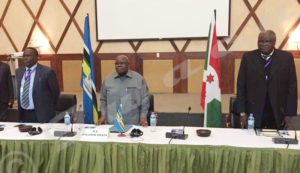
Benjamin Mkapa: “I could not give in to this requirement and accept the excuses that accompanied them.”
To show the solemnity of this last session according to the facilitator Benjamin Mkapa, the national anthem, “Burundi bwacu” preceded by that of the EAC were sung in the conference room of Ngurdoto Mountain Lodge hotel in Arusha. It is with a loud voice that the political class that was present sang this song dear to Burundians. “It’s been a long time,” admits one of the participants in this round.
After this moment of patriotic awakening came the opening speech by the facilitator Mkapa. He chose every word with great care. He wanted to be well understood.
“This is a very important session of a very high level compared to the consultations I conducted on the Burundian crisis following the 2015 elections,” he said.
“This round is important because it is the last one before I present my recommendations, my report and my conclusions to the Summit of Heads of State of the East African Community which mandated me”.
When I presented the results of the 4th session, recalled the facilitator Mkapa, I was recommended to guarantee one thing: reaching a consensus and conclusions on the inter-Burundian dialogue. And they asked me to hold one last session.
“It was because I had told them that I thought I had finished my work and that it was my last-ditch effort. But they told me that it is not over yet, that it was necessary to conduct further consultations for a very last session, “said the former Tanzanian head of state.
According to him, his will to conclude expeditiously this dialogue was dictated by the decision of the Burundian government to postpone all activities related to the dialogue after the constitutional referendum.
After the promulgation of the new Constitution, I asked my team to contact the Burundian government, the political parties, the opposition in exile, the civil society, the young people, the women, the religious groups and the media in order to hold the 5th and last session with a draft agenda.
“After these consultations, I believed I had had a consensus of all the protagonists on the need to continue this inter-Burundian dialogue. It was to have a basis for discussions on important issues and to prepare a roadmap for the 2020 elections. He said it was to ensure free, fair and credible elections at the national and international levels.
Impossible to give in to all the requirements
On the basis of the conclusions of these consultations, he said, the invitations were issued to hold this session from 19 to 24 October. “The government has asked that this round be postponed so that it can start on the 24th and end on the 29th of the same month. I accepted this request. But the government once again requested that this session be scheduled for November and that the list of participants be sent to it.
A new revelation from the facilitator: “The government subsequently proposed that the discussions focus on the Kayanza Roadmap. I could not give in to this requirement and accept the excuses that accompanied them. And that’s how I decided to make arrangements for this session to be held. ”
Until today, said Mkapa, I have not yet had any formal notification from the government stating if they intend to take part in this session.
A “homework assignment”
In the light of all these circumstances, said this former head of state, I propose that you take into consideration the 2018 Kayanza and Entebbe roadmap. He also notes that they are not consensual.
“I ask you to take advantage of these two roadmaps, work on these documents to come up with another roadmap that will include all the essential proposals that can lead to credible elections in 2020”.
He drew a conclusion: “As far as I’m concerned, I’m going to make a roadmap based on the Kayanza Roadmap and the one you will produce in this session”.
Afterwards, the facilitator said he will produce a report on this dialogue that he will submit to the mediator and the summit of the heads of state of the East African Community as a guide.
Verbatim
Pancrace Cimpaye, member of CNARED
 “The absence of the government in this session is positive. It is that the government facilitates the task. The opposition constitutes a block. This is a great advantage, an asset. We are about thirty and as thick as thieves, which could not be the case if the government had been here. They would have tried to divide us by all means and today we have this peace of mind to work together and constitute a united front. Today, the whole world knows how to situate the blockage and when the blockage is well located, it becomes very easy to find a solution “.
“The absence of the government in this session is positive. It is that the government facilitates the task. The opposition constitutes a block. This is a great advantage, an asset. We are about thirty and as thick as thieves, which could not be the case if the government had been here. They would have tried to divide us by all means and today we have this peace of mind to work together and constitute a united front. Today, the whole world knows how to situate the blockage and when the blockage is well located, it becomes very easy to find a solution “.
Marie-Louise Baricako, Women and Girls Movement for Peace and Security
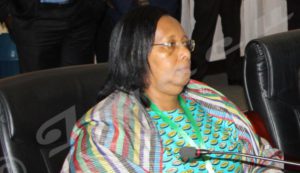 “We are disappointed by the attitude of the Heads of state of the EAC. They did not support the facilitation office. They did not commit themselves to peace in Burundi. They could see the government’s hesitations, but did not dare tell it what they wanted, what they thought. It is strange to say that this is a last session when there has never been a real dialogue session.
“We are disappointed by the attitude of the Heads of state of the EAC. They did not support the facilitation office. They did not commit themselves to peace in Burundi. They could see the government’s hesitations, but did not dare tell it what they wanted, what they thought. It is strange to say that this is a last session when there has never been a real dialogue session.
Analysis by Guibert Mbonimpa
Bujumbura, master of clocks until when?
Towards the 6th round of inter-Burundian dialogue? On Thursday (October 25th), Prosper Ntahorwamiye, secretary-general and government spokesman, said on Isanganiro radio that the recommendations from this 5th session of the dialogue only concern the participants. Bujumbura continues to impose its tempo against all odds. Back on a predictable boycott.After imposing its own agenda on the facilitation, Bujumbura feared losing its hand. And for good reason, its roadmap for the 2020 elections was not retained as a working document to submit to the opponents. Or, this so-called “road map” is all that interests Bujumbura. At several times, the ruling party said that this roadmap was acquired, non-negotiable.Fearing to fall into a trap that it set itself, the one who claims to have a dialogue concluded had no other option than dodging.
The fear of Bujumbura was that its roadmap be considered as it is: a proposal of the group bringing together the government, the ruling party and its satellite parties is likely to be confronted to the one handed to the facilitator, last September, in Entebbe, by the internal and external opposition group, an unacceptable thing for Bujumbura and its allies.
What Bujumbura fears above all is a proposal for validation of the next elections by an international or at least mixed body. This would call into question the partiality of the National Independent Electoral Commission, which would be diluted. In this respect, the appointment of Dr. Pierre-Claver Kazihise, well known in the sphere of the civil society pro- CNDD-FDD when he chaired the Association for the consolidation of peace in Burundi (ACOPA), at the head of the commission, feeds the arguments of the detractors of the new CENI.
In search of the real challenge
Teams of the office of the facilitation supported by the AU, UN cannot neglect such a proposal on the pretext of provoking the wrath of Bujumbura. The challenge is not the return from exile of some of the heavyweights of the Burundian opposition. It’s rather the holding of credible, transparent and peaceful elections whose results would be accepted by all political parties in competition.
The more Bujumbura seeks to play the game of peace talks, the more it runs the risk of losing its quality of master of the clocks, either by being imposed the agenda of the opponents having branched out into the armed struggle, or by the final whistle of the facilitator stating that the game is over.
Written by Abbas Mbazumutima and translated by
Pierre Emmanuel Ngendakumana

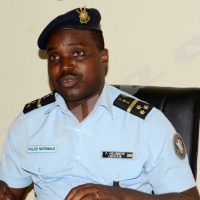
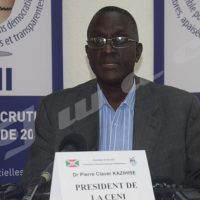
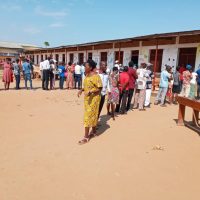
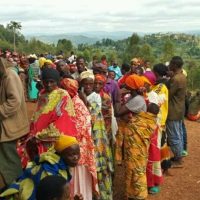
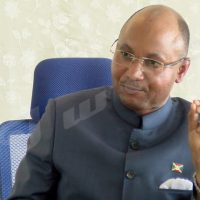













 IWACU Open Data
IWACU Open Data

